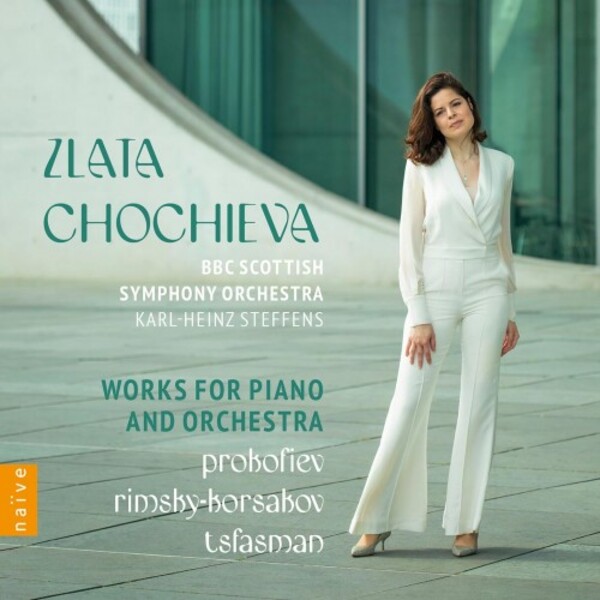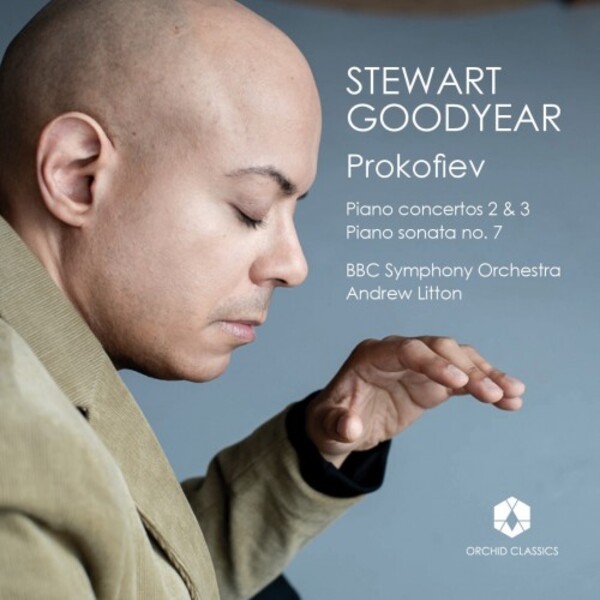PROKOFIEV Piano Concertos (Stewart Goodyear. Zlata Chochieva)
View record and artist detailsRecord and Artist Details
Genre:
Orchestral
Label: Naïve
Magazine Review Date: 11/2024
Media Format: CD or Download
Media Runtime: 64
Mastering:
DDD
Catalogue Number: V8448

Tracks:
| Composition | Artist Credit |
|---|---|
| Concerto for Piano and Orchestra No. 2 |
Sergey Prokofiev, Composer
BBC Scottish Symphony Orchestra Karl-Heinz Steffens, Conductor Zlata Chochieva, Piano |
| Concerto for Piano and Orchestra |
Nikolay Rimsky-Korsakov, Composer
BBC Scottish Symphony Orchestra Karl-Heinz Steffens, Conductor Zlata Chochieva, Piano |
| Jazz-Suite for two pianos |
Alexander Tsfasman, Composer
BBC Scottish Symphony Orchestra Karl-Heinz Steffens, Conductor Zlata Chochieva, Piano |
Composer or Director: Stewart Goodyear
Genre:
Orchestral
Label: Orchid Classics
Magazine Review Date: 11/2024
Media Format: CD or Download
Media Runtime: 75
Mastering:
DDD
Catalogue Number: ORC100335

Tracks:
| Composition | Artist Credit |
|---|---|
| Concerto for Piano and Orchestra No. 2 |
Sergey Prokofiev, Composer
Andrew Litton, Conductor BBC Symphony Orchestra Stewart Goodyear, Composer |
| Concerto for Piano and Orchestra No. 3 |
Sergey Prokofiev, Composer
Andrew Litton, Conductor BBC Symphony Orchestra Stewart Goodyear, Composer |
| Sonata for Piano No. 7 |
Sergey Prokofiev, Composer
Stewart Goodyear, Composer |
Author: Marina Frolova-Walker
Prokofiev’s Second Piano Concerto sits uneasily between lush Romanticism and abrasive modernism. When he was still a daring young pianist-composer in St Petersburg, Prokofiev had written a piano concerto whose score was lost in the revolutionary upheaval. In the Paris of the early 1920s, he decided to reimagine the piece for his new audience, which accounts for the mixture of styles. Prokofiev was also in competition with Stravinsky for the plaudits of the Paris audience, and to ensure that he would outstrip his rival, he pushed the concerto to the outer limits of virtuosity – it took several decades before enough intrepid pianists finally hauled it into the repertoire.
Prokofiev’s Second is still not over-recorded, so it is a great surprise to see two performances issued at the same time. The concerto appears on Stewart Goodyear’s all-Prokofiev disc (alongside the Third Concerto and Seventh Sonata), and also in Zlata Chochieva’s more eclectic mix, with Rimsky-Korsakov’s Concerto and Tsfasman’s Jazz Suite.
But there is no danger of duplication, since the interpretations could hardly be further apart. Goodyear has mastered Prokofiev’s toccata style to the point of unbeatable brilliance – his steely-fingered articulation is thrilling and awe-inspiring, and the climaxes are dazzling for their sheer energy and drive. But he seems to be less interested in exploring the lyrical corners of Prokofiev’s style, or indeed in seeking any deeper meaning beyond the many attractions on the surface of the music. Chochieva, by contrast, manages to deliver the first movement as if it were Rachmaninov, saturated with gloom, but no less engrossing for that (although Prokofiev was known for his modernist high jinks, he had a great admiration for the older composer). Chochieva always brings out the melody, even when an avalanche threatens to engulf it. Even in the more consistently modernist second-movement Scherzo, she still somehow finds Rachmaninov’s bell sounds in the texture. Her toccata passages are enlivened by elaborate phrasing and masterly separation of the textural layers, while her rich palette of tonal colours translates into different characters and moods – sometimes haunting, at other times fragile, and with moments of tragedy, too.
At the start of the finale, with light scurrying figures flitting between the instruments, we can appreciate just how well the BBC Scottish Symphony interact with Chochieva and support her ideas, with Karl-Heinz Steffens at the helm. The richness of Prokofiev’s orchestration is given ample opportunity to shine, and Chochieva knows when to pull back into an accompanying role. In comparison, the balance on the Goodyear disc is very much in favour of the pianist, so the BBC SO under Andrew Litton (a distinguished Prokofiev specialist) stay, a little disappointingly, in the background.
Chochieva’s maturity and style make her recording of Prokofiev’s Second Concerto a major achievement, and she devotes the same care to the now lesser-known Rimsky-Korsakov Concerto, an attractive if much less ambitious work. The Tsfasman suite remains a rarity outside of Russia (despite recent recordings by Mikhail Pletnev and Chiyan Wong). The composer was a jazz orchestra leader well known to the Soviet public, and managed to maintain his career through all the political ups and downs (jazz was often under scrutiny for ‘bourgeois decadence’). Although an interesting choice, the performance feels a little too well-behaved to draw the best out of the piece. In any case, the three pieces seem to occupy such different worlds that I could not convince myself that the selection hangs together.
Goodyear’s programming, if anything, errs on the side of uniformity. The bright and energetic approach he takes to the Second Concerto and Seventh Sonata can sound relentless unless the pieces are given a separate hearing. The middle movement of the Third Concerto is perhaps the high point of the disc, with the variations delightfully characterised. The first movement of the Seventh Sonata loses some of its sinister mysteries to the speed and brilliance that Goodyear unleashes. The sonata’s finale showcases Goodyear’s best qualities, and his unwavering tempo and mechanistic rhythm seem to be impervious to the almost impossible leaps Prokofiev demands of the performer. This prompts us to wonder how on earth Prokofiev managed to smuggle the optimism of Twenties ‘machine age’ music into a Stalin-era wartime sonata, but Goodyear certainly makes us pleased that the composer got away with it.
Discover the world's largest classical music catalogue with Presto Music.

Gramophone Digital Club
- Digital Edition
- Digital Archive
- Reviews Database
- Full website access
From £8.75 / month
Subscribe
Gramophone Full Club
- Print Edition
- Digital Edition
- Digital Archive
- Reviews Database
- Full website access
From £11.00 / month
Subscribe
If you are a library, university or other organisation that would be interested in an institutional subscription to Gramophone please click here for further information.




